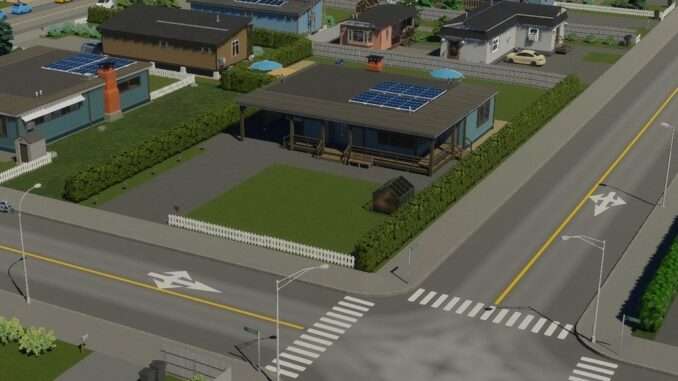
Economy
Economy is a menu that shows information about the city’s income and expenses and allows the player to adjust taxes and budget and take loans. The panel can easily be found by pressing the icon that looks like stacked green dollars.
From the Budget tab, you can take a quick glance at the city’s Revenue, Expenses, and its current Monthly Balance. Additionally, highlighting each section reveals quick details of each of the revenues or expenses on the right side of the panel. It includes a description as well as an overview of where the revenue or expenses come from.
All cities will initially receive a limited amount of income. The higher the income from other sources, the lower the government subsidies income will be, until it will eventually stop.
Taxation
Taxation tab

Taxation is unlocked at Milestone 2. Each of the zone types has its own overall tax rate which can be adjusted with sliders. On top of that, you can adjust the taxes of individual groups by expanding the menu for a specific zone type. Each tax can be set to be between -10% and 30%.
Lower taxes help buildings level up faster while higher taxes bring more money.
Residential taxes are collected from the citizens’ monthly wages. Lower taxes will increase demand for residential zones while higher taxes will lower it. Taxes can be set separately for each Education Level.
Commercial, Industrial and Office taxes are collected from the companies’ monthly profits. Taxes can be set separately for each product type. Lowering taxes for certain products and increasing them for others is an effective way to specialize the city in a certain field.
Loans
Loan tab
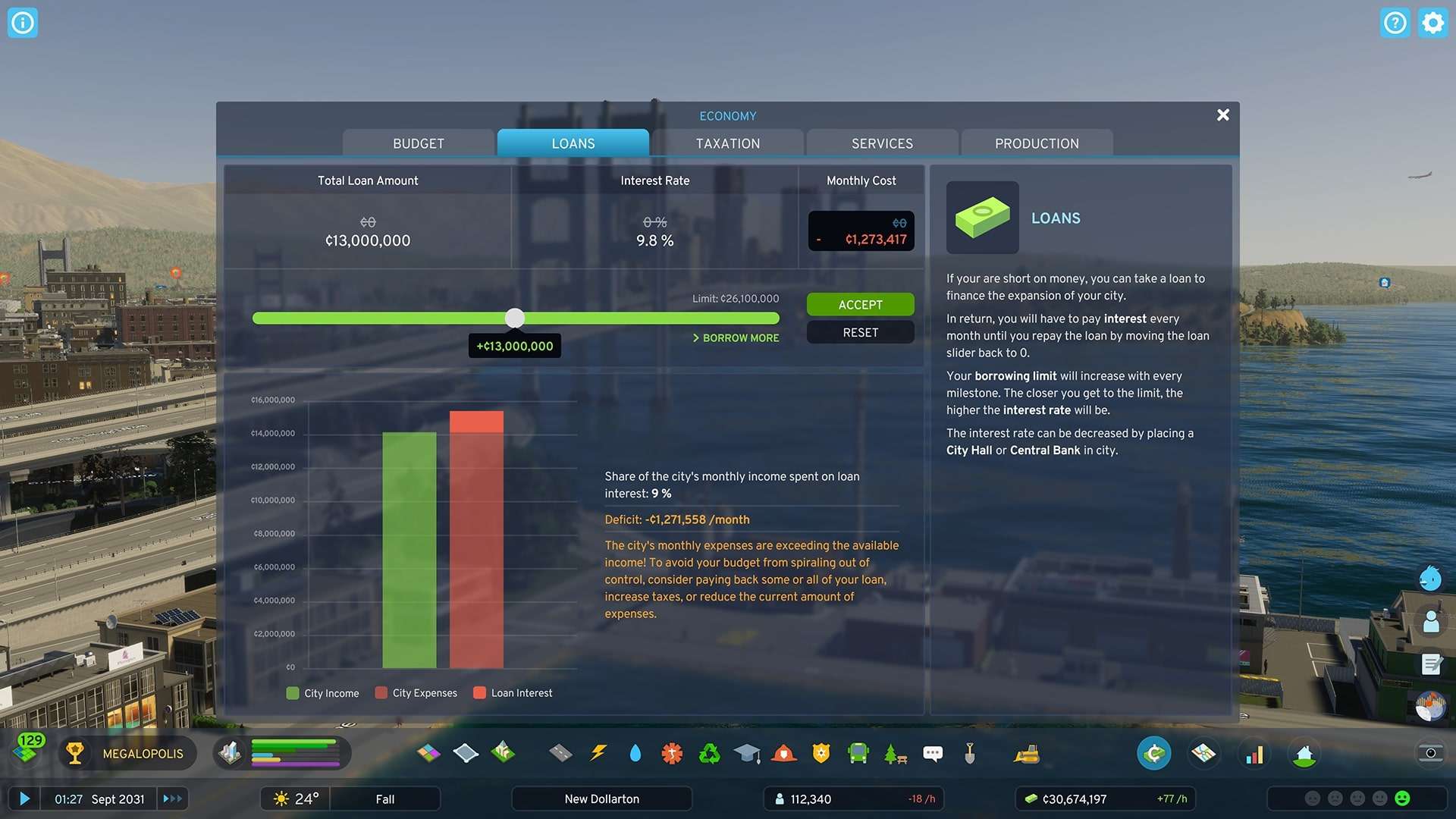
Loans are large sums of money that a city can take at the cost of adding up to 2.3-20% of the loaned amount to monthly expenses. The loan can be increased or paid partially or in full at any point. The borrowing limit of the loan depends on the current Milestone, ranging from ₡100,000 to ₡26,100,000. The interest rate can be reduced by 1% by building the City Hall and by 2% by building the Central Bank.
The loans tab is not visible in games with unlimited money.
Production
Production tab

From the Production tab you can observe each of the Materials, Material Goods, and Immaterial Goods your city is producing, and from that you can also observe whether your city’s production of the resource is either in Surplus or in Deficit. You can highlight each resource to reveal additional information which shows you where the resource can be gained from and where it can be either sold or used. For example, Wood can be produced from Forestry or it can be imported. Wood is also used for Heating and it can further be sold to Processing companies or be Exported to Outside Connections.
All resources will be imported if there is a deficit and exported if there is a surplus.
Materials
Materials are obtained by Specialized Industry zones.
| Input | Resource | Use |
| Forestry zone | Wood | Heating Processing Timber |
| Grain Farming zone | Grain | Processing Beverages Processing Convenience Food Processing Petrochemicals |
| Livestock Farming zone | Livestock | Processing Convenience Food Processing Food Processing Textiles |
| Vegetable Farming zone | Vegetables | Processing Beverages Processing Food |
| Textile Fiber Farming zone | Cotton | Processing Textiles |
| Oil Drilling zone | Crude Oil | Processing Chemicals Processing Petrochemicals |
| Ore Mining zone | Metal Ore | Processing Metals |
| Coal Mining zone | Coal | Electricity Processing Steel |
| Stone Mining zone | Rock | Processing Concrete Processing Minerals |
Material Goods
Material goods are processed at Industrial zones.
| Input | Resource | Use |
| Ore | Metals | Processing Glass Processing Machinery Processing Vehicles |
| Coal Metals | Steel | Processing Machinery |
| Rock | Minerals | Processing Chemicals Processing Electronics |
| Rock | Concrete | Upkeep |
| Metals Steel | Machinery | Industry |
| Crude Oil Grain | Petrochemicals | Consumers Electricity Heating Processing Plastics Processing Textiles |
| Crude Oil Minerals | Chemicals | Consumers Processing Pharmaceuticals Processing Plastics |
| Chemicals Petrochemicals | Plastics | Consumers Processing Electronics Processing Vehicles |
| Chemicals | Pharmaceuticals | Consumers Healthcare & Deathcare |
| Minerals Plastics | Electronics | Consumers Service Software Service Telecom |
| Metals Plastics | Vehicles | Consumers |
| Grain Vegetables | Beverages | Consumers Retail Entertainment |
| Grain Livestock | Convenience Food | Consumers |
| Livestock Vegetables | Food | Consumers Fire & Rescue Retail Lodging Retail Meals |
| Cotton Livestock Petrochemicals | Textiles | Consumers |
| Wood | Timber | Upkeep Processing Furniture Processing Paper |
| Timber | Paper | Consumers Offices |
| Timber | Furniture | Consumers Offices |
Immaterial Goods
Immaterial goods are processed at Commercial or Office zones.
| Input | Zone | Resource | Use |
| Electronics | Office | Software | Industry Offices Service Financial Service Media Service Telecom |
| Electronics Software | Office | Telecom | Consumers Industry Offices |
| Software | Office | Financial | Consumers Industry Offices |
| Software | Office | Media | Consumers |
| Food | Commercial | Lodging | Consumers |
| Food | Commercial | Meals | Consumers |
| Beverages | Commercial | Entertainment | Consumers |


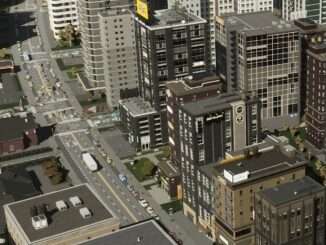
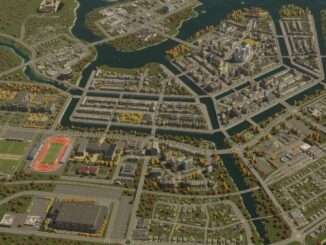
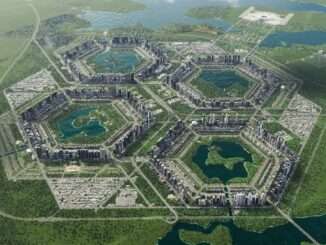
Be the first to comment